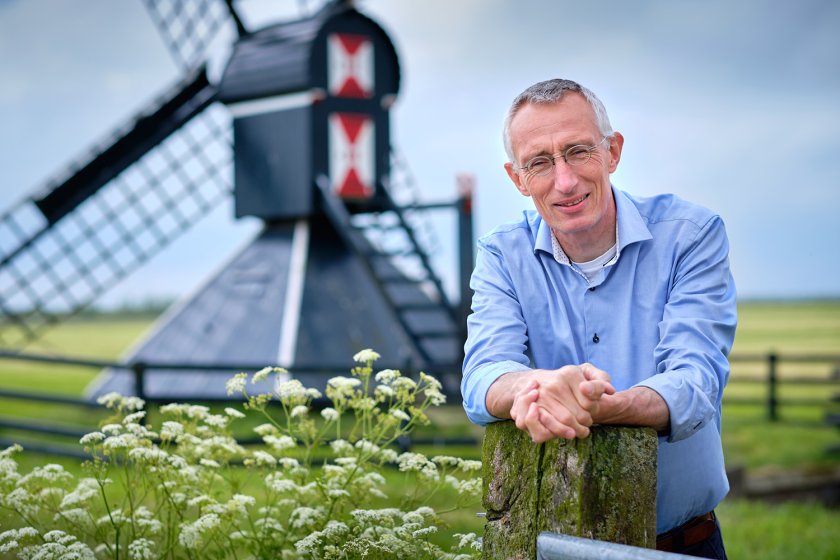
category_news
Fact check: just how harmful is methane?
Methane contributes to global warming; it is therefore a greenhouse gas. Of all the methane produced in the Netherlands, 70% comes from livestock farming. A substantial percentage. But how harmful is it? Because, unlike other greenhouse gases, methane breaks down relatively quickly in the atmosphere. Theun Vellinga, senior researcher at Wageningen Livestock Research, explains.
What greenhouse gases are there and how do they differ?
Greenhouse gases are important. They form a blanket around the earth. Without greenhouse gases, it would be unbearably cold on earth. The problem with the greenhouses gasses is that we too much of them. The blanket becomes so thick, that the earth's temperature rises. This causes periods of drought and in other places too much precipitation, the polar caps melt, and so on.
Vellinga: "There are three greenhouse gases: carbon dioxide (CO2), methane (CH4) and nitrous oxide (N2O). Roughly speaking, you can say that all three are created during the breakdown or combustion of organic substances. CO2 (and NOx) are mainly created through the combustion of diesel, lignite or gasoline. Not only in transport and traffic, but also in production processes. From the concrete in your house to the staples in your furniture, almost everything in our lives produces CO2 during its production.
Methane is released during the breakdown of organic substances. For example, in the gastrointestinal tract of animals. Ruminants (cows, goats, sheep) in particular produce a lot of methane. Methane is also 34 times more powerful than carbon dioxide. So, the earth warms up extra fast when there is more methane in the atmosphere. N2O is created in processes where nitrogen compounds play a role: in manure storage and manure application."
What is the theory of the short carbon cycle and is it correct?
"CO2 stays in the atmosphere for a very, very long time. Many thousands of years. So that greenhouse gas accumulates, and the 'blanket' around the earth thickens. The unique thing about methane is that it halves in the atmosphere in just over 8 years. The other half becomes CO2. So if you emit 100 kilos of methane today, in 8.5 years there will be 50 kilos left, and after another 8.5 years only 25 kilos, and so on," Vellinga explains. "That CO2 has gone through what is known as the short carbon cycle: it was converted by grass, corn, etc. into plant material, which the cow converts back into CO2 and CH4. And that CH4 becomes CO2 again pretty quickly. Nothing to worry about, you might say."

"But be careful not to make the problem too small. Before you know it, it seems as if there is nothing wrong with methane. On the contrary. As long as methane is in the atmosphere, it contributes very strongly to warming. Over the lifetime of methane, this is as much as 80 to 100 times more than CO2.
But the advantage is that it disappears quickly. Reducing methane emissions can cause the concentration of methane in the atmosphere to drop and therefore even reduce the greenhouse effect. When reducing CO2, the current greenhouse effect remains the same and only does not increase. So reducing methane is more effective than reducing CO2. But it has to be done both ways."
What is the farmer to do now? And what is WUR doing?
"Emissions from livestock farming are a serious problem. Despite considerable improvements in recent decades, there is still much to be done to reduce greenhouse gases", says Vellinga, "Moreover, there really is still room for improvement. But, as I argued in Dutch newspaper NRC before, the farmer cannot do it alone. You and I, and other consumers, also have to get to work. You can't keep shaking your head and buying the cheapest meat & dairy from the store at the same time.
The farmer is just one of the links in an entire agricultural food system, which consists of supplying companies, supporting services, processors, supermarkets and finally the consumer. Together they form a chain of interdependencies. Each party in this chain must be held accountable for its responsibility to become more sustainable."
Integral approach
Commissioned by the Dutch Ministry of Agriculture, Nature and Food Quality, Wageningen University & Research, LTO, CLM and Schuttelaar & Partners are investigating an integral approach to the methane and ammonia problem in the Netherlands. The approach aims to offer livestock farmers in the Netherlands, on any type of soil, a choice of appropriate solutions.